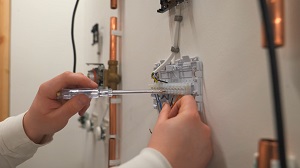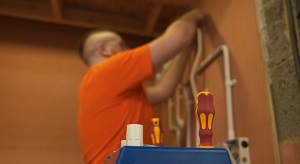Preparing to deliver T Levels: How Middlesbrough College prepared their staff, workshops and wider college teams to deliver T Levels for the first time
Last year we visited Middlesbrough College who have been delivering the Onsite Construction and Building Services Engineering T Levels since 2021 and have since added more T Levels to their curriculum.
As one of the first colleges to deliver T Levels, we wanted to speak to Mike Emery, Associate Director of Construction and Emma Richardson, Work Experience and T Level Industry Placement Team Leader about some of the ways in which they prepared to successfully deliver T Levels, what they found worked well, and what they've learned along the way.
Q: How did you prepare during the 12-month countdown to delivering T Levels?
 One of the first things we had to do was plan the staff that were going to be delivering the programmes including bringing in extra staff to deliver the core components of the T Levels and to work alongside our plumbing, electrical, and joinery staff to deliver the Onsite Construction and Building Services Engineering T Levels.
One of the first things we had to do was plan the staff that were going to be delivering the programmes including bringing in extra staff to deliver the core components of the T Levels and to work alongside our plumbing, electrical, and joinery staff to deliver the Onsite Construction and Building Services Engineering T Levels.
All staff have had CPD in advance of the T Levels being delivered. The staff shared a lot of good practice and because there were many different staff delivering different modules within the T Levels, they all shared the practice to make sure that we were prepared in advance.
There were also a lot of changes to the workshops and a lot of equipment that was purchased using the T Level funding. Many of the workshops had to be redesigned and we had to think about the space that would be required and the type of equipment that would need to fit into that.
Q: How did you decide to structure the curriculum and structure the delivery into the academic week?
Due to the large number of hours that are associated with a T Level, we had to make sure that the hours were divided over the week to allow the students to get in enough theory hours for the core units.
We decided to do a practical element, part of the Occupational Specialism, in the first year alongside the core units and also to set aside a day where the students could either catch up on work or be allowed to go out on industry placement once we'd sourced that placement.
We deliver the T Levels across a four-day timetable: one day of practical, three days of theory, and the remaining day is for the industry placement.
Q: How did you use the support provided by City & Guilds?
 The City and Guilds webinars were really useful in terms of helping us with the planning documents, having discussions around planning the first year up to the core exams, the explanations of how the T Level would unfold, and what the key markers were over the first year of the T Level.
The City and Guilds webinars were really useful in terms of helping us with the planning documents, having discussions around planning the first year up to the core exams, the explanations of how the T Level would unfold, and what the key markers were over the first year of the T Level.
All staff were encouraged to go to the webinars to find out more information and ensure that we were prepared well in advance of the T Level starting.
Q: What was the biggest challenge you faced?
The biggest challenge was fitting in all the meetings that we required to discuss who was doing what, what equipment we needed, what changes were going to be needed in the workshops, and just making sure that everything was planned to the nth degree so that we were ready for when it started.
Q: What are you going to do differently this year?
This year the focus is going to be heavily on establishing mock papers and mock assessments and having milestones where the students are assessed so that we can understand what their grade may be at the end of the year
We're also putting more focus on the Employer-Set Project because that plays such an important part, making up a third of the marks for a T Level. So, the timing of the mock Employer-Set Project and then the window to complete the Employer-Set Project is going to be so important.
Q: What was the level of interest like from learners and what activities did you do to tell learners about the new courses you were going to be offering?
The level of interest was really good for electrical, plumbing and joinery. We started the year making sure that there was a lot of marketing promotion out to the local area, that we engaged with all the employers in the local area to make sure that everything was planned for the industry placements for the students.
To help the students understand what the T Level was about, we invited them into the College for sessions, and we spoke to the parents as much as the students, about what the content of the T Level would be, and the commitment required to be successful on the programme.
Q: How did you address the industry placement?
 We started in June time when the students were going off on their holidays. The team would work on business development to get into the industries, do networking events, and contact them by phone and email to reach out to the employers we needed.
We started in June time when the students were going off on their holidays. The team would work on business development to get into the industries, do networking events, and contact them by phone and email to reach out to the employers we needed.
The workplace coordinators are responsible for building relationships with employers. They visit the employers, discuss the objectives that we put in place for the students, and do the health and safety vetting. We discuss the T Level programme and how that can benefit them and the student.
We have changed a lot of processes this year. We brought in new CRM systems to help with the placement matching. We can now put that placement online, the students can view the placement, and make sure that it's geographically viable for them to get to and they can then apply through that system.
Q: What advice would you give to other colleges who are about to start delivering T Levels?
My one piece of advice would be to make sure they’ve got the right staff teaching on the programme and make sure that they plan every week that passes through the year to make sure that they’re getting the most from their planning and their delivery to give the best results for the students.
You can find more information about T Levels on our website.